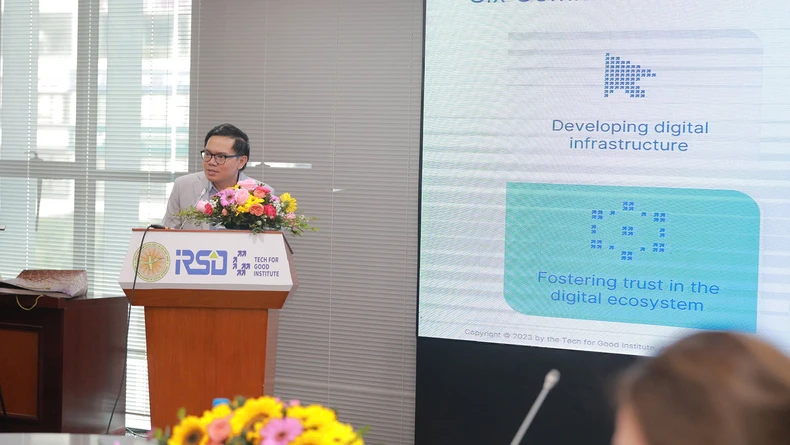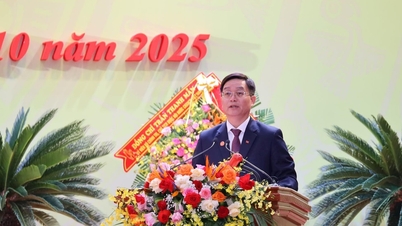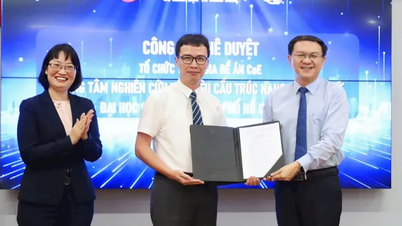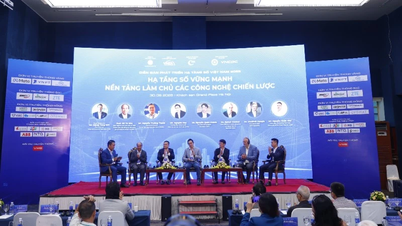NDO - Technology is currently playing an important role in many areas of life. So how to develop technology to not only promote the economy , but also create sustainable values for the community.
These are the contents that scientists and domestic and international experts discussed at the workshop "From technology for growth to technology for the community: Ready to participate effectively in the digital economy" organized by the Institute for Regional Sustainable Development Studies (IRSD), Vietnam Academy of Social Sciences (VASS) and the Technology for the Community Institute (TFGI), Singapore.
The workshop is an opportunity for domestic and international experts, a number of management agencies and businesses to share development trends in technology and digital economy, and discuss challenges and recommendations to not only promote economic growth, but also create sustainable, inclusive values for the community in the region, including Vietnam.
Sharing through the presentation "From technology for growth to technology for community", Mr. Keith Detros, Program Manager of TFGI Institute, commented that digital technology and technology-based business models are expected to be tools to promote growth in the Southeast Asia region when the digital economy accounts for more than 10% of the total GDP structure in 4 out of 6 Southeast Asian countries: Indonesia, Malaysia, Philippines, Thailand and Vietnam.
 |
Mr. Keith Detros, Program Manager of TFGI Institute shared at the workshop. |
Mr. Keith Detros said that the digital economy in Vietnam contributes 14.26% of the total GDP, the highest among the 6 countries. However, the rapid development of the digital economy is accompanied by challenges regarding inequality, cybersecurity risks, employment trends and the environment. The report said that 54% of businesses operating in the digital economy participating in the survey in Vietnam want to solve issues related to sustainable development, but the level of implementation and the level of actual action are still low, at 31% and 4% respectively.
For the digital economy to be a driving force for sustainable, inclusive and equitable growth, close coordination and cooperation between the government, businesses and digital economy participants are essential in the areas of technological innovation, business models and policies, as well as building a strong digital society with digital infrastructure, digital skills and quality digital human resources. Therefore, policies need to be developed promptly, consistently and avoid overlaps to continue creating an environment that encourages businesses to start up and participate in the digital economy, aiming to develop the digital business community and address new challenges of the digital economy.
Meanwhile, the report “The gig economy with the case of technology cars in Vietnam” by the Institute for Regional Sustainable Development (IRSD) raises the question “Is the world experiencing a revolution in employment?”.
According to the World Bank, by 2023, an estimated 435 million people will participate in the gig economy (also known as the contract economy/freelance economy), accounting for 12% of the global labor market, and this rate in Vietnam is 14% and is forecast to continue to increase in the coming time. The gig economy includes many types of jobs at different levels such as cleaning, office work, IT programming, art activities or consulting.
In Vietnam, driving a technology car is one of the most popular jobs known in the gig economy. According to a survey by the IRSD Institute, there are three factors that make a person decide to become a technology driver or a driver partner of technology ride-hailing platforms such as Grab, Be, GoJek. Those three factors are income, time flexibility and sustainable development.
Accordingly, more than 80% of technology drivers surveyed found that factors such as income, quality of life, spirit and family time all increased and agreed that work helps them be proactive about time and can arrange more time for family.
Regarding sustainable development, more than 80% of drivers surveyed agreed that driving technology helps to take advantage of idle personal assets to share, save resources and reduce emissions by using GPS to pick up and drop off passengers at the right location. Most drivers participating in the study identified driving technology as their main job and wanted to stick with it for a long time in the future, which raises issues to promote sustainable digital economic development, harmonizing the responsibilities and interests of businesses and individuals participating in the digital economy.
Along with reports from the two institutes, the open discussion session provided multi-dimensional perspectives from policymakers, domestic and international experts and technology enterprises on employment trends from the development of the digital economy, as well as ways to effectively utilize the development of technology and the digital economy and bring sustainable benefits to the community.
Dr. Trinh Thu Nga, Institute of Labor Science and Social Affairs, said that in the coming time, digital transformation and digital economic development are considered "vital" choices for breakthroughs in Vietnam's socio-economic development. The National Human Resource Development Strategy in general and of each locality in particular in the next 10 years must focus on solving the problem of proactively adapting human resources, to access the achievements of new science and technology and resolve its challenges.
Accordingly, it is necessary to focus on the following measures: Firstly, develop and perfect the national digital capacity framework, as well as have a strategy to enhance this capacity for the people in general and the workforce in particular (through the development and implementation of a project to popularize basic digital skills for the people; as well as training programs, equipping digital skills for workers - with the active participation of the public and private sectors, especially technology enterprises).
Second, special attention should be paid to having specific training mechanisms and policies for informal workers (especially untrained or low-skilled workers) so that they can be equipped with appropriate knowledge and labor skills, including digital skills, with the aim of supporting them in transitioning to the formal sector and adapting to the transformation and application of new technologies in the coming time.
From a business perspective, Ms. Dang Thuy Trang, Director of External Relations at Grab, shared that one of the difficulties of technology enterprises is awareness and openness to approach new points. The government has had many policies and efforts to promote the digital economy, but there needs to be synchronization between industries and fields so that technology enterprises can continue to contribute to the digital economy and promote micro, small and medium enterprises to participate in the digital economy.
Sharing his views on this issue, Associate Professor Dr. Bui Quang Tuan emphasized that the policy institutions for the new economic model also need to be adaptive to create a development environment for the digital economy. With the improvement of policy institutions, as well as changes in awareness from the workforce and people in general, technology will contribute to promoting stronger digital economic development, and also create sustainable, inclusive values for the community in the region, including Vietnam.
Source: https://nhandan.vn/phat-trien-cong-nghe-vi-cong-dong-post845907.html


![[Photo] Panorama of the cable-stayed bridge, the final bottleneck of the Ben Luc-Long Thanh expressway](https://vphoto.vietnam.vn/thumb/1200x675/vietnam/resource/IMAGE/2025/9/30/391fdf21025541d6b2f092e49a17243f)

![[Photo] General Secretary To Lam, Secretary of the Central Military Commission attends the 12th Party Congress of the Army](https://vphoto.vietnam.vn/thumb/1200x675/vietnam/resource/IMAGE/2025/9/30/9b63aaa37ddb472ead84e3870a8ae825)
![[Photo] Solemn opening of the 12th Military Party Congress for the 2025-2030 term](https://vphoto.vietnam.vn/thumb/1200x675/vietnam/resource/IMAGE/2025/9/30/2cd383b3130d41a1a4b5ace0d5eb989d)
![[Photo] The 1st Congress of Phu Tho Provincial Party Committee, term 2025-2030](https://vphoto.vietnam.vn/thumb/1200x675/vietnam/resource/IMAGE/2025/9/30/1507da06216649bba8a1ce6251816820)
![[Photo] President Luong Cuong receives President of the Cuban National Assembly Esteban Lazo Hernandez](https://vphoto.vietnam.vn/thumb/1200x675/vietnam/resource/IMAGE/2025/9/30/4d38932911c24f6ea1936252bd5427fa)
































































































Comment (0)